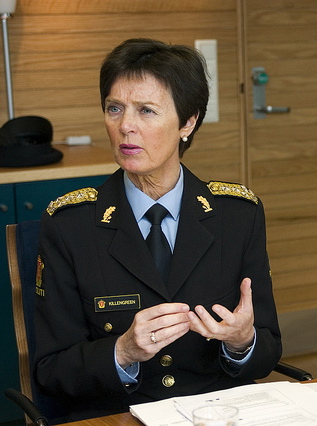Ingelin Killengreen, who served as director of Norway’s state police in the 10 years leading up to last year’s terrorist attacks in Oslo, was subjected to tough questioning on Monday by the special parliamentary committee probing poor emergency response. Killengreen frustrated leading politicians on the committee when she either refused or failed to answer questions put her.

Killengreen spent around two hours being grilled by such top politicians as Martin Kolberg of the Labour Party, whose former Justice Minister Knut Storberget had kept Killengreen in the job for so long, and Anders Anundsen, leader of the parliament’s disciplinary committee from the Progress Party. Both of them, from opposite ends of the political spectrum, seemed dissatisfied with Killengreen’s response.
Nowegian Broadcasting (NRK) reported how Killengreen took little direct responsibility for the police’s failure to respond more quickly to last year’s attacks, or to earlier complaints about everything from the lack of a coordinated emergency communications network in Norway to shortcomings in the system for issuing national alerts.
It’s been reported that she knew the national warning system wasn’t functioning before she stepped down in the spring of 2011, but she failed to get it fixed. She refused to answer many specific questions on Monday but denied there was an ukultur (literally a culture of bad management) within the state police.
“I can’t point to any special things wrong in the management culture of the police other than the work done to make management better,” testified Killengreen. She conceded, though, that it’s “highly possible” the management team she led for 10 years should have put more demands on operative leaders in the police.
Killengreen held Norway’s highest police post from 2001 until 2011, when her specially renewed term ran out just months before the attacks occurred on July 22, 2011. The government-appointed commission that investigated the emergency response, and whose report is now being followed up by the parliamentary committee, concluded that the police let the country down, and that if they’d done a better job, the lone terrorist could have been caught before he carried out a massacre on the island of Utøya.
Asked whether she didn’t represent the management culture in the police, which has been shown to have been unresponsive, Killengreen responded that “I think it’s difficult to answer that. I did lead during that period, and what happened then occurred under my leadership.”
That’s about as close Killengreen came to admitting any responsibility for the police inability to act more quickly on July 22, and MP Jette Christiansen of Labour wasn’t satisfied either. “For me, it’s incomprehensible to listen to you when you contend there wasn’t anything wrong with the management culture in the police,” Christiansen said.
Killengreen said she told the July 22 Commission that management in the police can be better. She said she disagreed with assertions last week by Jon Lea, who leads the state directorate for security and preparedness, that weaknesses within preparedness can be blamed on the police.
Killengreen has complained herself that the Justice Ministry, which has ultimate responsibility for the police in Norway, involved itself too much in management and issued too many performance goals. Asked why she wanted to continue as police director under such circumstances, she responded that she still thought she had something to contribute.
After refusing to answer several detailed questions, including why a tip on who bombed government headquarters wasn’t spread to police on patrol, Kolberg came with a rebuke. “I have a hard time dealing with your failure to answer,” Kolberg said. He stressed that she was the boss for many years, but Killengreen continued to refuse comment. When asked to give her assessment of what went wrong on July 22, she said merely that there were various reasons, “and I ask for understanding that I can’t comment on the police action.” She was no longer in charge when it occurred.
Killengreen maintained a high-level public sector job after stepping down as police director, and now holds a post in the government ministry in charge of administration and renewal. She’s part of the team now responsible for rebuilding the government headquarters, a process expected to take at least another decade.
Views and News from Norway/Nina Berglund
Please support our news service. Readers in Norway can use our donor account. Our international readers can click on our “Donate” button:

